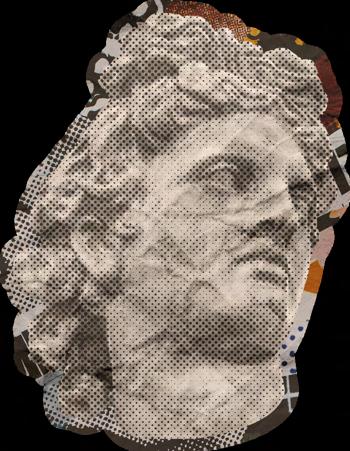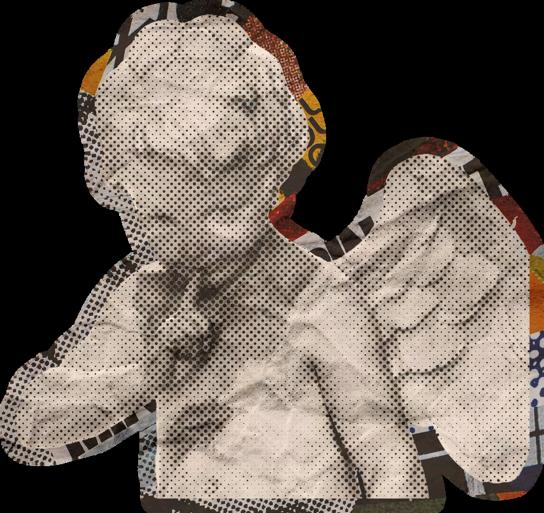first firs years’ years

GUIDE 2025
PSYCHE
GODDESS OF THE SOUL










PRESIDENT’S ADDRESS
HeyHello!WelcometoUNSW.MynameisPriscillaandIam absolutelydelightedtointroduceyoutothePsychologySociety ofUNSW.

priscilla zanak
As the constituent Psychology society at UNSW, PsychSoc aims to provide students with an enriching university experience connecting you with like-minded individuals and creating life long relationships, helping you cope with stress and burnout during your university life, bonding through the crisis of exam periods together and connecting you with professionals to help youbecomeindustryready!
Our fundamental values of inclusivity and diversity means that you will find a forever family in UNSW PsychSoc no matter where you are from or what your interests pertain. When I took a leap of faith during my second year and joined PsychSoc as a Marketing Subcommittee, I was ridden starstruck by the compassion, intelligence and outreach of my fellow members. I was fortunate enough to meet the friendliest and kindest groups of people I have ever encountered, and two years later, the rest is history. Through my years in PsychSoc, I have met some of my closest friends, progressed my individual skills as a leader,madecorememoriesanddevelopedmycareerexperience.
As 2025 begins, I hope that UNSW PsychSoc could provide the same, if not, more for you! Grab every opportunity that comes your way at uni and make the most out of your time here. As cliche as it may sound, the uni experience truly circulates around‘youwillgetasmuchasyouputin.’
These previously unfathomable experiences would not have been possible without that firstleapoffaith.Ihopetoseeyouaround.






ACADEMIC STAFF’S
ADDRESS


Hello and welcome! My passion is teaching students like you how to applypsychologicalscienceinordertothrive,achieveyourgoals,and helpothers–thatis,todeveloppsychologicalliteracy.Iwanttohelp you to “think like psychological scientists”, applying critical and creative thinking to challenge your pre-existing beliefs and cognitive biases, and to problem-solve in a scientific and ethical manner that benefitsyouandthosearoundyou.Alargefocusofmyteachingison student wellbeing – teaching evidence-based self-management and positive psychology strategies to help you to achieve your goals, including maintaining positive relationships, feeling good, and doing wellatuniversityandbeyond.





appliedpsychology

I’m a cognitive psychologist. Cognitive psychology involves trying to understand things like memory, attention, and reasoning… basically, how the mind takes in and uses information. We’ve learned so much about how the mind works over the last halfcentury, and I’m passionate about sharing that knowledge with students and the general public. I’m also excited by the role that studentscanplayinsharingthisknowledgemorebroadly,andone ofmyfavouritethingsoverthelastfewyearshasbeenhelpingour UNSW undergraduates find ways to communicate their passions andintereststoinspirepeoplebeyondtheUNSWcampus.

cognitivepsychology



EDITOR’S NOTE
Welcome to PsychSoc’s First Years Guide and a very warm welcome to UNSW Psychology! If you feel daunted by the university journey that lies ahead of you, you’ve come to the right place. As the Academics Directors of 2025, along with our Marketing portfolio, we have written, designed, and compiled a compact publication to help you throughout your first year at UNSW.
This guide will include information about campus life from the initiatives of PsychSoc on campus or online, to the best places to grab food or study on campus, and first-year exclusive events. Keep reading to answer your burning questions about your degree and beyond!
Find more information on events, campus life, academics, careers, and more on the UNSW PsychSoc website, in our publications, and on our social media.
Feel free to ask us any questions about your university experience by messaging our social media pages or reaching out to a PsychSoc member. Take it easy, have fun, and we will see you around campus!

AngelinaandAdrian AcademicDirectorsof PsychologySociety









F i r s t Y e a r F i r s t Y e a r

Helpful Apps! Helpful Apps!

TripView TripView Opal Travel Opal Travel
TripView allows you to create travel plans for trains, light rail, buses, metro lines, and ferries. It also automatically updates its timetables according to realtime delays or ccidents so you can plan your trip to uni on the go!

Google Maps Google Maps
Google Maps is super helpful for locating what buildings your tutorials and lectures are in. The app provides real-time GPS navigation, traffic, and transit info! It’s also handy for finding alternative bus and train routes (alongside TripView) when public transport is out of whack!

The official Opal card app lets you manage trips on public transport and save routes for later reference. You can also check your balance and transaction history to know when to top up (which you can do from the app).

Lost on Campus Lost on Campus

You can use this app to locate every tutorial room, lecture theatre, coffee shop, carpark, bus stop or toilet on campus! It also gives you photos of the classroom you’re looking for; however, it will only give you a linear route to the destination (so check with Google Maps how to actually get to the building).
Lower Campus (Gate 2)

Public Transport Public Transport
Closest Train Station:
Lightrail:
Central Station
To change at Central Station to the Lightrail, head to the Central Chalmers Street Stop, which is accessible via the Elizabeth St. exits from Central Station.
You can use the L2 Randwick or L3 Juniors Kingsford Lines to get to UNSW.
Lightrail:L3JuniorsKingsford LineandgetoffatUNSW AnzacParade
Bus:Takethe370fromGreen SquaretoUNSWGate2


Upper Campus (Gate 8)
Lightrail:L2RandwickLineand getoffatUNSWHighStreet
Bus:Takethe370fromGreen SquaretoUNSWGate8
Tip: As psychology students, most of your tutorials and lectures will be on upper campus (e.g. Mathews Building), so be sure to catch the L2 Line to avoid walking up the Basser Steps. But always check the building you’llbeinandplanaheadsoyoudon’tarrivelateforyourclasses!

Notangles and CrossAngles are unofficial UNSW timetable planners that are useful for planning your courses before your enrollment period rolls around! After selecting your classes (e.g. PSYC1001 and PSYC1011), you can see when the tutorials and lectures run for that course. This is super handy in helping you decide how many days you wanttocometouniandwhetheryourtutorialsfromdifferentcoursesclash.
Moodle is UNSW’s online learning platform, where lectures and assessment notifications will be uploaded. Here, your course convenors will communicate with students through weekly announcements and digital course content, sokeepaneyeoutforthesethroughouttheweek!

Tip:DownloadOutlookonyourphonetoseenotificationswhenyourcourseconvenorsmakeannouncements
fromMoodleonthego!
myUNSW is your access point for UNSW services and resources. Here, you’ll be able to register and enrol for classes throughout the year and pay your SSAF (student services and amenity fee), which you’ll have to pay each term! You can also access your WAM and academic standing and reports for each term when results are released afteryourassessmentperiods.

The Nucleus: Student Hub
TheNucleusisthe‘goto’placeforadviceonanything relatingtoyourdegree,enrollment,orothergeneral supportregardingessentialuniversityprocesses.
Location:rightoftheMainLibraryentrance
UNSW Psychology & Wellness
UNSW Psychology and Wellness is a confidential counselling service available to all students at UNSW who would like to seek mental health support. Information concerning the booking of appointments, billing,andmorecanbefoundbelow. (https://www.student.unsw.edu.au/counselling)
:IntheQuadrangle

Academic advice for first year students from PsychSoc’s 2025 committee!
1.Honours&YourPsychology WeightedAverageMark(WAM)
If Honours is something you are interested in, itʼs important to know that your Psychology WAM (the weighted average of your marks in psychology ‘core coursesʼ throughout your degree)needstobeaboveacertainthreshold.
This means that the saying ‘Ps get degreesʼ doesnotholdifHonoursisagoalofyours.Itʼs recommended that you attempt to maintain a psych WAM of 75 or more during your first year since content only gets more difficult as you progress through your degree. Even though first year is an amazing time to have fun, meet new people and experience new things, donʼt give up on your academics and saveyourselffromfuturestressbymaintaining ahealthy‘work-lifeʼbalance.
2.ROUTINE!StudyMethods& MOREROUTINE!!!

Of course, that is not to say that WAM is everything. First-year is a time to meet new people,figureoutwhatdoesanddoesnʼtwork foryou,havefun,andsomuchmore.Aslipup here and there is normal during such a turbulent period in your life. First-year is a learning experience and you can always recover your WAM in later years. Your first yearasaunistudentissomethingthatyoucan never get back so enjoy it to the fullest and takecareofyourself!

The most common academic advice you will get is to STAY ON TOP OF YOUR LECTURES, and this is for good reason. Unlike high school, no one is there to check on you so it becomes extremely easy to procrastinateandleavethelecturestill‘later Pleasebewiseandlearnfromthemistakesof others (almost every uni student ever…) instead of having to learn the hard way yourself. You do NOT want to reach exams with 20+ lectures to grind through. Try creating your own routine and find study methods that work for you. Psychology coursesdumpaLOTofcontentonyouFAST so finding a method that works for you is VITALifyouwanttomaintainahealthyworklifebalance!Somecommonmethodsinclude flashcards and spaced repetition, mindmapping, annotating the slides instead of makingnotes,andeventrivianightswithyour friends!

3.OtherTips!
For PSYC1001 & PSYC1011, DO YOUR SONASTUDIESANDGETALLTHEBONUS POINTS!4pointsmaynotsoundlikemuch, butitiseasilythedifferencebetweenaCredit andaDistinction,orevenaDistinctionanda HighDistinction.
Donʼt get too obsessed with finding the ‘perfect systemʼ or writing the ‘perfect sentenceʼ.Perfectioncanbeparalysing;itʼs easiertojustwritesomethingandedititlater thangetstuckononeparagraphforaweek orspendmoretimeperfectingasystemthan actuallystudying.




adviceforfirstyears

“What is something you wish you knew as a first year student?”
‘Everyone's pace in university is different. Coming from high school, where everyone followed similar schedules and was working towards similar goals, it can feel strange to see people you know taking different paths and doing different things - some might be going into jobs, changing degrees/majors, taking gaps, seeing different people. Don’t stress if your timeline looks different from others'.
—
JaydenLuong(ProductionsSubcommitee)

‘Give yourself time to work it all out! It's okay to be a bit dazed and confused in your first few weeks, so just ride the wave. Also, if you want to make friends, it's very likely the people in your tutorial want to as well, so just say "Hi!" and put yourself out there and I'm positive it'll work out!!’
—EthanLee(Academics
Subcommitee)
‘To be open-minded and get out of my comfort zone as much as possible - the effort you put into your social life or academics, is what you’re going to get back.’


—KathyBui(ProductionsDirector)
‘Apply for the social opportunities that UNSW offers like clubs, volunteering programs etc. I had an excessive fear of rejection and didn’t start making use of these opportunities until second year. The friends and memories I’ve made since second year onwards have been amazing but they would’ve been great points of support from first year had I stepped outside of my comfort zone earlier!’
—PriscillaZanak(President)



food foodspots spots
1st
PHOHOUSE

LocatedatthePavilions,UpperCampus



Serves authentic Vietnamese food in a casual, open dining setting. The menu features their very popular pho, rice paper rolls, salad rolls, juices, salads and more. Also, it’s relatively inexpensive! Open weekdays,
2nd YALLAHEAT
LocatedintheUniversityTerracesbuilding,lowercampus.
Offers a range of Middle Eastern foods and is definitely the place to go if you are super hungry since their meal bundles are HUGE!

3rd STOCKMARKET
LocatedintheUpperCampusfoodcourt(MatthewsArcade)
Choose from a range of salads or build your own! They also offer pasta and soups. (Tip: you can get free bread with any order!)

4th
4th GUZMANYGOMEZ STELLINIS






studyspots studyspots
peermentoring peermentoring


2nd


Morven Brown / 3rd



y 4th

UNSW Psychology offers a peer mentoring program to support your transition from high school to university. The program consists of weeklymeetingsduringyourfirstterm of university, where you will join a small group of fellow first years mentored by older psychology students. Your mentors will help answeranyquestionsaboutuniversity in general, your degree, exam preparation and more. Joining peer mentoring is a great opportunity to meet new friends and get to know your peers, and also ask any questionsyoumayhave!
howtosignup howtosignup
If you are interested in participating inPeerMentoring,keepaneyeoutfor a Moodle announcement after Oweek, typically on your PSYC1001 Moodlepage,whichwillprovidemore information on the Peer Mentoring programandaregistrationlink.









societylife

What is Arc?
Arc @ UNSW is a student-run organisationthataimstoenhancethe student experience by providing a variety of services, facilities, and opportunities for students. You can join Arc for free to sign up for societies, sports, and volunteering, and receive free resources and discounts to events! Sign up for Arc duringO-weekattheArcStall,atthe Arc reception during the term, or completethemembershipformonthe officialArcwebsite.

What are Societies?
UNSW is home to over 300 clubs and societies for you to join. These range from facultyassociated clubs (such as UNSW Psychology Society!)tohobbiessuchassports,gaming,and even cat appreciation. Societies are one of the best ways to meet new people, make new friends, learn new skills, and step out of your comfortzone.Wehighlyencourageyoutomake the most of your university experience by joiningasociety,especiallyinyourfirstyear.







2. Subcommittee Member
1. General Member
Signuptosocietiesasageneralmember through spArc in order to attend their events. Feel free to sign up for all the clubs and societies that you are interested in, as it’s an easy, low-stakes way to meet new people and participate in fun events at university with a lower commitmenttothesociety.

Subcommittee members (’subcom’) of a society are part of the internal team and play a role in planning, organising, and executing the events and resources provided by the society to the external community. Societies tend to consist of portfolios catering to its different aspects, such as academics, socials, marketing, and more. Being a subcommittee member of a society generally involves attending weekly meetings, bondings such as road trips and dinners, as well as responsibilities in your designated role. Joining a society as subcom is a much greater commitment compared to being a general member; however, what you put in is what you get out, and many can testify that the friendshipsandexperiencesmakeitworthyourtime.

howdoijoinasubcom?

how do i ajoin society?
To join a subcommittee, you usually have to submit a written application as well as pass an interview stage. This can seem daunting at first, but it never hurts to giveitatry!Beingpartofasocietyasasubcommittee member is extremely rewarding, and is a great opportunity to make life-long friendships, learn new skills,andbeinvolvedwithsomethingmeaningful.

AboutPsychsoc
UNSW Psychsoc is the society for all UNSW psychology students, and othersinterestedinpsychology.Weareastudent-ledorganisationaimingto connect the psychology cohort with the School of Psychology, as well as provide opportunities for students’ personal, professional, and social development.UNSWPsychsoccreatesvariouseventsandreleasesresources throughout the year to help support your academic and career growth, boostyourwellbeing,andhelpyoumakenewfriends.
Psychsoc consists of seven portfolios which work together to ideate and executeeventstomeettheaimsofthesociety.
Academics
Careers
Marketing
Productions
Socials
Sponsorships
Wellbeing


Recruiting Soon!
Do you want to be a part of UNSW Psychsoc? We are looking for any studentsenthusiastictojoinoursubcommitteeinoneoftheportfolioslisted above. If you want to be a part of our collaborative environment and contribute to our events and resources for the upcoming year, make sure to followourFacebookpageformoredetailsandupdates!
Stay Updated
SpArc:
ThisisArc’smembershipportalwhere you can go through all the societies at UNSW. Join PsychSoc on SpArc to stay up to date on our initiatives throughouttheyear!
Facebook:
Follow our official Facebook page, UNSW Psychsoc, to view our latest events and initiatives. Be sure to also join our Facebook community group, Psychology UNSW, for exclusive communitypostsandannouncements.
Instagram: Mailing list:
FollowourInstagrampage, @unswpsychsoc, to stay up to date with our events and also other fun psychologycontent!
Subscribetoourmailinglistwhichcan befoundonourwebsite,
www.unswpsychsoc.com, for insider info on our events and be updated on upcomingopportunities.


















































Events Timeline
PsychSocorganisesover50eventseachyeartomeetthediverse interestsandneedsofourpsychologycommunity.Hereareafew highly anticipated upcoming events on the horizon—be sure to checkoutoursocialmediaforupdatessoyoudonʼtmissout!

Term1
FirstYearsCamp
MeetnʼGreettheDirectors
Psyc1ABARAssignment
WritingWorkshop
Volunteeringexpo
Term3
MeettheSupervisors
PsychSocAnnualBall
AnnualCareersFair






Term2
Interfaculty City Cruise
Industry Mentoring Program
Project Mind
Psyc1B Revision Workshop
Psychtown
Social Pubcrawl




First Years’ Camp

Get Ready for an Unforgettable Start to Your Uni Journey! PsychSocʼs Annual Orientation Camp is your first chance to dive into university life and bond with your fellow psychology students. This isnʼt just any camp – itʼs your opportunity to createlastingfriendshipsandmemoriesthatwillmakeyourfirst yearunforgettable!
As a first-year student, camp is the event to meet new friends, connect with classmates, and have fun! Over three action-packed days (March 7th-9th, Week 2, T1), youʼll take on team challenges, buildconnections,andexperiencethebestofunilifewithyourfuture psychology cohort. You wonʼt forget the laughs, the moments, and thepeopleyou'llmeet!
Don’tMissOut!
Tickets will be available during O-week, sokeepaneyeout!You'llbeabletograb yours by scanning a QR code at the PsycSoc Stall or through our Facebook Event page. And donʼt worry if you miss the first round – more tickets will be released, but they go fast, so make sure to stay on top of updates by clicking “Interested”or“Going”onourFacebook page!









Ready to make this your best uni experience yet? Scan the QR codes below to catch a glimpse of whatʼs in store. We promise you wonʼt want to miss this crazy,fun-filledadventure!

CoreCourses


The three core courses required to complete first year psychology are PSYC1001, PSYC1011,andPSYC1111.Thesecoursesareonlyavailableonceayear,interms1,2,and 3 respectively. It is not necessary to complete these courses in your first year of study at UNSW, but it is important to note that completion of these three courses is a prerequisite for all Level 2 core courses (aside from PSYC2101, which only requires completion of PSYC1001).

Additionally, students completing a Psychology (Honours) degree must take PSYC1021, offered in term 1. Other psychology pathways, such as Psychological Science, Science, or Advanced Science(honours),mayhaveothermandatoryfirst year courses. Check the UNSW handbook to check the requirements for your degree program (https://www.handbook.unsw.edu.au/).


FirstYearElectives

There are a number of “first-year” psychology courses (you can do them any time!) that are offered by the UNSWSchoolofPsychology.Ifyouhavefreeelectives to do in your degree, and want to explore psychology outside of the mandatory core courses, it might be a good idea to take a look at these electives. These coursescoverarangeofcontentfromdifferentfieldsin psychology and are a great way to learn things you would not learn in your core courses. (Refer to the UNSW Handbook for course outlines, terms offered, modesofdelivery,etc.)


SONA
Mandatory research participation is a part of your final grade for the first year core courses PSYC1001 and PSYC1011. You are required to complete 4 hours of research participation for 4% of your final grade (1 point perhour)andmaycompleteupto8additionalhoursfor4 bonus marks (0.5 points per extra hour). These experiments are run by Honours students and academic staff in the UNSW School of Psychology. They provide you with a taste of the experimentation process necessaryforlaterpsychologystudies.
It is recommended that you complete your hours early in the term because the number of experiments that run and the time slots available later in the term are limited. Once term starts, course convenors will provide you with your SONA details and additional clarifyinginformation.



Resources

The UNSW Academic Skills Support website (https://www.student.unsw.edu.au/skills) provides useful information on referencing, AI use, writing skills, and much more. Other services areofferedtostudentstohelpbuildskills,suchasone-on-onesupport andworkshops.
UNSW PsychSoc has a tutors list on our website (https://www.unswpsychsoc.com/). These tutors are previous students who performed well in their psychology courses and are willing to offer tutoring services to current students. Furthermore, PsychSocwritespracticeexampapersforallfirstandsecondyearcore psychology courses. Freely available on our website, these are invaluablerevisionresourcesforallpsychologystudents!



Hey! Thank you for reading through the First Years’ Guide!! Our Academics port worked really hard to compile all this information into a neat little guide, and Marketing with the design and formatting.
We really hope you’ve gotten some good insight or advice, whether it be how to prepare for your uni classes, or where to eat! First Years’ Guide is also a little peek into UNSW PsychSoc, who we are and what we do for the psych student community! So don’t be afraid to reach out, it’s what we’re here for


We want to shoutout our amazing T3 Marketing Subcommittee for all the work they’ve done for First Years’ Guide and O-Week. Lovely subom Warisa made the front and back cover (which she DREW HERSELF!!).
Alice worked incredibly hard (while overseas too...) with us directors to decorate and design the content pages! And if you haven’t already seen the stunning UNSW PsychSoc’s O-Week post, that was made by Dani!

Anyways, we’ll leave you now to explore what else uni life has to offer! See you around...hopefully at camp
lots of love,

SophiaandXiaoru, MarketingDirectors








T1 Checklist!



EnrolledandregisteredforTerm12025classes
AppliedforOpalconcessioncard(ifyouarean Australiancitizenorpermanentresident)


CollectedstudentID
SignedupforArcandobtainedthe2025Arc membershipsticker


LoggedintoMoodle
Checkedimportantcourseannouncementsand courseoutlines
SigneduptoSpArc


JoinedPsychSoconSpArcandfollowedour socialmedia(Facebook,Instagram)






